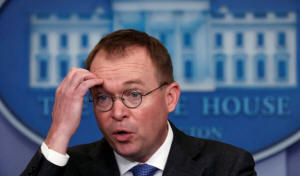|
Trump budget plan to seek funds for
border wall, infrastructure, opioid treatment
 Send a link to a friend
Send a link to a friend
 [February 12, 2018]
By Ginger Gibson [February 12, 2018]
By Ginger Gibson
WASHINGTON (Reuters) - President Donald
Trump will unveil his second budget on Monday, seeking to make good on
his promise to bolster military spending and requesting funds for
infrastructure, construction of a wall along the border with Mexico and
opioid treatment programs.
The budget plan, which is viewed largely as suggestions by Congress,
which has the constitutional authority to decide spending levels, will
likely draw criticism from conservatives who worry that Republicans are
embracing deficit spending.
The proposal will include $200 billion for infrastructure spending and
more than $23 billion for border security and immigration enforcement,
Mick Mulvaney, who heads the administration's budget office, said in a
statement on Sunday night.
It will also provide "for a robust and rebuilt national defense," he
said.
But the statement added that the proposal would recommend cuts that
would lower the deficit by $3 trillion over 10 years.

"The budget does bend the trajectory down," Mulvaney told the "Fox News
Sunday" program earlier on Sunday. "It does move us back towards
balance. It does get us away from trillion-dollar deficits."
The budget request will be delivered to Congress only days after Trump
signed off on a bipartisan spending agreement hammered out by lawmakers
that will increase domestic spending by $300 billion over two years -
including $165 billion in defense spending and $131 billion in
non-military domestic spending.
The White House plans to amend its request to take into account the
higher spending levels in the agreement that passed on Friday, a senior
official in the Office of Management and Budget said.
Mulvaney said on Sunday all that money did not need to be spent.
"These are spending caps," Mulvaney said. "They are not spending floors.
You donít have to spend all that."
The spending deal will add to the annual budget deficit, which will now
exceed $1 trillion in 2019, said the Committee for a Responsible Federal
Budget watchdog group.
Trump's previous budget was criticized for recommending cuts to spending
to achieve deficit reduction that ultimately even members of his own
Republican Party thought were untenable.
"I hope the budget that we see is workable and recognizes the landscape
we're in," said Senator Lisa Murkowski, a Republican member of the
Appropriations Committee. "A lot of times, what you have is a budget
that even the Cabinet secretaries can't defend."
[to top of second column]
|

White House budget director Mick Mulvaney holds a press briefing at
the White House in Washington, DC, U.S., January 19, 2018.
REUTERS/Kevin Lamarque/File Photo

DEFICIT DEBATE
"The president's budget is always a list of pretty good suggestions.
It's not 'the' budget," said Senate Budget Chairman Mike Enzi.
This year's budget is likely to stoke debates about deficits that
began when Congress passed a tax overhaul in December. The tax cuts
in the legislation contained no corresponding reductions in spending
and instead relied on arguments that the lower rates would stoke
economic growth.
Trump's budget will include a number of economic forecasts and is
expected to rely on estimates that the economy will keep growing at
a rapid pace for the foreseeable future.
Such forecasts could obscure the level of deficit spending, said
Robert Greenstein, president of the progressive Center for Budget
Policy and Priorities.
"It'll essentially be another budget gimmick, alongside rosy
economic assumptions, to make the deficit smaller than it will
actually be," Greenstein said.
The budget proposal will include two key elements - $18 billion over
two years for Trump's long-promised border wall and $200 billion in
federal funds to spur $1.5 trillion in infrastructure investments
over the next 10 years with state, local and private partners,
Mulvaney's statement said.
Trump promised during the 2016 campaign that Mexico would pay for
the border wall, which the Mexican government has insisted it will
not do.
Democrats oppose the wall, which Trump has said is aimed at keeping
out illegal immigrants and drug smugglers.

The budget will also seek some $13 billion in new funding over the
next two years to combat the opioid epidemic.
In addition, it will request $85.5 billion for veterans' health, the
administration said.
(Reporting by Ginger Gibson; Additional reporting by David Morgan
and Katanga Johnson; Editing by Doina Chiacu and Peter Cooney)
[© 2018 Thomson Reuters. All rights
reserved.]
Copyright 2018 Reuters. All rights reserved. This material may not be published,
broadcast, rewritten or redistributed.
Thompson Reuters is solely responsible for this content. |